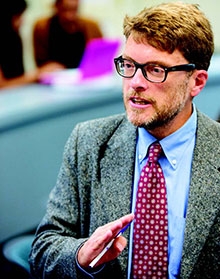The View From Segal: Conquering Headwinds
| by Jeff Dayton-Johnson

2018 has been a challenging year for all of higher education, but especially for graduate education. Enrollment is down at graduate schools across the country, which is often the trend during periods when the economy is especially strong, making it less attractive for students to forgo one or two years in the workforce to further their education. It’s also more difficult to recruit international students right now due to the political atmosphere in the United States and uncertainty about the availability of visas both during and after graduate studies.
The Institute is one of hundreds of graduate institutions across the country facing these headwinds and working to adapt to them. Over the past two years we’ve revisited and updated our recruiting strategy, sharpening our focus on the prospective students who are most likely to choose the Institute. We believe these efforts have reduced the impact the Institute has felt compared to other schools around the nation. While our incoming class this fall is on the small side, it’s not an outlier in terms of the ebb and flow we have experienced over the past two decades.
Compounding our challenge is the fiscal landscape we must navigate at the same time. For a number of years, the overall Middlebury enterprise—including the College, the Institute, the Language Schools, the Schools Abroad, and other components—has run an operating deficit. Over the past two years, we’ve made significant progress in reducing the deficit through a variety of creative cost-saving measures. However, the largest portion of Middlebury’s operational costs—68 percent—consists of faculty and staff compensation and benefits. As a result, the next phase of spending reductions in spring 2019 will include elective, incentive-based separation plans designed to reduce faculty and staff numbers in both Vermont and California.
Even as we’re making hard choices designed to lower costs, however, we’re also exploring a variety of strategies for growing our existing programs. Demand is increasing for lower-residency hybrid programs where a significant portion of classwork is done in an online environment. We have already piloted courses in this vein—notably our successful Spanish Community Interpreting Certificate program—and are working steadily toward introducing new options that promise to attract a wider range of prospective students.
At this time, we’re also grateful to be celebrating two of the largest individual gifts the Institute has ever received (see stories elsewhere in this issue). With our continuing focus on delivering innovative programs and the continuing support of the Institute’s global community of alumni and friends, I’m confident that we will conquer these headwinds together, buoyed by our shared commitment to training the next generation of global change-makers.
